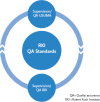Ad hoc surveys at the Robert Koch Institute
- PMID: 35586802
- PMCID: PMC8848777
- DOI: 10.17886/RKI-GBE-2018-088
Ad hoc surveys at the Robert Koch Institute
Abstract
The Robert Koch Institute (RKI) regularly conducts nationally representative cross-sectional studies (KiGGS, DEGS and GEDA) as part of the nationwide health monitoring system. In addition to these health surveys, data is collected in telephone interviews either on specific thematic fields (such as diabetes) or specific groups (such as medical staff) that were not or only insufficiently covered by the larger health surveys. As they are flexible and fast, ad hoc surveys conducted via telephone interviews can respond to specific epidemiological and health political questions. This article describes the procedures applied in ad hoc telephone interview surveys, which were newly introduced as a standardised method in 2017 and are applied by the Laboratory for Health Surveys at the RKI. The article presents the stages of project management such as concept development, establishment of a concept for data protection, questionnaire development, pre-test and field phase, calculation of weighting factors and provision of the final data set. The aim is to describe the process and shed light on the standardised procedures, the reported quality indicators and the breadth of possible scenarios of application.
Keywords: HEALTH MONITORING; METHODOLOGIES; PROJECT MANAGEMENT; QUALITY ASSURANCE; TELEPHONE INTERVIEW.
© Robert Koch Institute. All rights reserved unless explicitly granted.
Conflict of interest statement
Conflicts of interest The authors declared no conflicts of interest.
Figures
References
-
- Hoffmann R, Lange M, Butschalowsky H, et al. (2018) KiGGS Wave 2 cross-sectional study – participant acquisition, response rates and representativeness. Journal of Health Monitoring 3(1):78-91 https://edoc.rki.de/handle/176904/5637 (As at 10.07.2018) - PMC - PubMed
-
- Kamtsiuris P, Lange M, Schaffrath Rosario A. (2007) Der Kinder- und Jugendgesundheitssurvey (KiGGS): Stichprobendesign, Response und Nonresponse-Analyse. Bundesgesundheitsbl 50:547-556. https://edoc.rki.de/handle/176904/401 (As at 10.07.2018) - PubMed
-
- Lange M, Butschalowsky H, Jentsch F, et al. (2014) Die erste KiGGS-Folgebefragung (KiGGS Welle 1) Studiendurchführung, Stichprobendesign und Response. Bundesgesundheitsbl 57:747-761. https://edoc.rki.de/handle/176904/1888 (As at 10.07.2018) - PubMed
-
- Kamtsiuris P, Lange M, Hoffmann R, et al. (2013) The first wave of the German Health Interview and Examination Survey for Adults (DEGS1). Sampling design, response, weighting, and representativeness Bundesgesundheitsbl 56:620-630. https://edoc.rki.de/handle/176904/1519 (As at 10.07.2018) - PubMed
-
- Paprott R, Heidemann C, Stühmann LM, et al. (2018) First results from the study ‘Disease knowledge and information needs - Diabetes mellitus (2017)’. Journal of Health Monitoring 3(S3):22-60. https://edoc.rki.de/handle/176904/5680 (As at 10.07.2018) - PMC - PubMed
LinkOut - more resources
Full Text Sources
Research Materials



